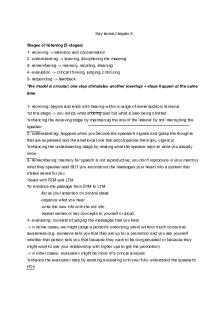Chapter 4 key terms PDF

| Title | Chapter 4 key terms |
|---|---|
| Author | Margaret Watson |
| Course | Business strategy |
| Institution | University of Toronto |
| Pages | 2 |
| File Size | 62 KB |
| File Type | |
| Total Downloads | 85 |
| Total Views | 147 |
Summary
business key terms for types of economies and governments ...
Description
Key Term
Definition
Political System
The type of government by which a government is run.
Economic System
The way a country organizes its resources and distributes goods and services to its citizens.
Market Economy
Also known as capitalism or private enterprise, an economic system determined by free competition, in which businesses, consumers, and government act independently of one another, market forces and self-interest determine what goods are created and sold.
Centrally Planned Economy
Also known as communism or command economy, an economic system in which the government controls all elements of the economy, including prices, wages, and production.
Mixed Economy
Also known as a modified free enterprise system, an economic system that sits between a market economy and a centrally planned economy, combining government intervention and private enterprise.
Democracy
A state governed by all eligible members of the population through elected representatives. A democracy is characterized by free and fair elections, the rule of law, free speech and press, the right to assembly, and freedom of religion
Autocracy
A state governed by a single individual or a small group of people with unlimited power.
Underdevelop ed Countries
Also referred to as the least-developed or third-world countries, nations that are at the lowest level of the world’s economies. Underdeveloped countries are characterized by severe poverty, a lack of social services, poor infrastructure, and have economies that are predominantly agriculture- or resource-based.
Developing Countries
Also known as emerging or second-world countries, nations in transition from a poor economy to a prosperous one. Developing countries are characterized by a movement away from agriculture and natural resources towards more industrialization, as well as improved literacy rates, increased access to health care, and technological advancement.
Developed Countries
Also known as industrialized or first-world countries, nations that are characterized by a high per capita income or gross domestic product, and have moved from a reliance on primary industries into predominantly tertiary industries. Developed countries have high standards of living and literacy rates, and make major advancements in health care and technology.
Gross The total goods and services produced in one country in one year. Domestic Product (GDP)
Business Cycle Recurring periods of increased and decreased economic activity, or expansions and contractions. The business cycle is characterized by four stages: recession, trough, expansion, and peak. Absolute Advantage
The ability of one country to use its resources to make a product or service more efficiently than other countries.
Opportunity Cost
The value of what is foregone, or the cost of giving something up to get something else. For example, the opportunity cost of being in class is the money a student could make working at a job.
Comparative Advantage
The ability of a country to produce a good at a lower opportunity cost than another country. Comparative advantage is the foundation for specialization and trade.
Lobbying
The process through which companies, special interest groups, or individuals attempt to influence government officials and persuade them to endorse public policy favourable to these groups....
Similar Free PDFs

Chapter 4 key terms
- 2 Pages

Chapter 3 key terms
- 2 Pages

Chapter 14 Key Terms
- 2 Pages

Chapter 3 Key Terms
- 3 Pages

Biology UNIT 4 Key Terms
- 3 Pages

Key terms chapter 3 pdf
- 5 Pages

Key terms chapter 6 pdf
- 8 Pages

Key Terms
- 3 Pages

Chapter 4 - KEY - Key
- 4 Pages

Chapter 4 Terms and Definitions
- 5 Pages

Finals, key terms
- 23 Pages

Japanese Key Terms
- 11 Pages
Popular Institutions
- Tinajero National High School - Annex
- Politeknik Caltex Riau
- Yokohama City University
- SGT University
- University of Al-Qadisiyah
- Divine Word College of Vigan
- Techniek College Rotterdam
- Universidade de Santiago
- Universiti Teknologi MARA Cawangan Johor Kampus Pasir Gudang
- Poltekkes Kemenkes Yogyakarta
- Baguio City National High School
- Colegio san marcos
- preparatoria uno
- Centro de Bachillerato Tecnológico Industrial y de Servicios No. 107
- Dalian Maritime University
- Quang Trung Secondary School
- Colegio Tecnológico en Informática
- Corporación Regional de Educación Superior
- Grupo CEDVA
- Dar Al Uloom University
- Centro de Estudios Preuniversitarios de la Universidad Nacional de Ingeniería
- 上智大学
- Aakash International School, Nuna Majara
- San Felipe Neri Catholic School
- Kang Chiao International School - New Taipei City
- Misamis Occidental National High School
- Institución Educativa Escuela Normal Juan Ladrilleros
- Kolehiyo ng Pantukan
- Batanes State College
- Instituto Continental
- Sekolah Menengah Kejuruan Kesehatan Kaltara (Tarakan)
- Colegio de La Inmaculada Concepcion - Cebu



